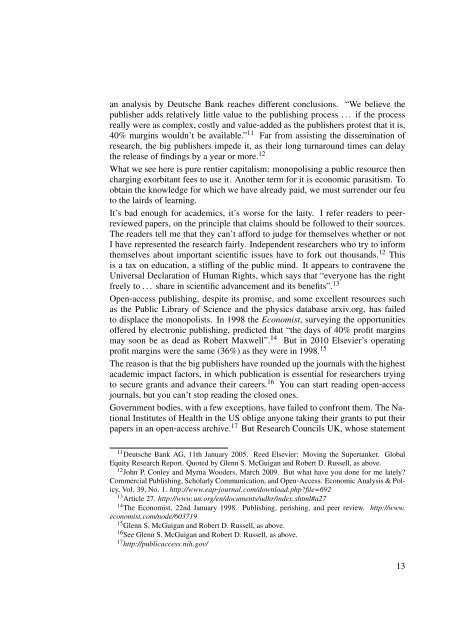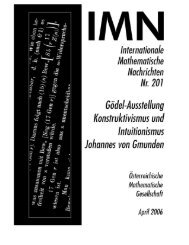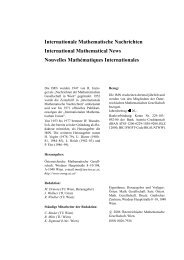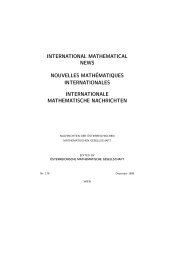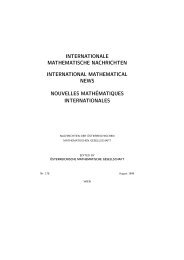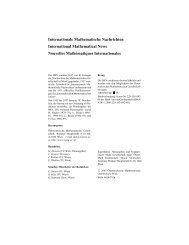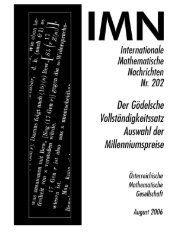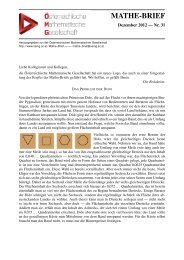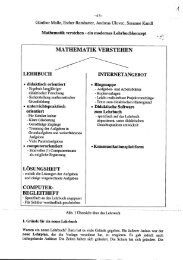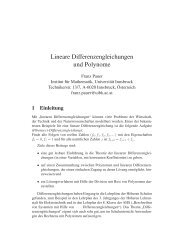218 - Ãsterreichische Mathematische Gesellschaft
218 - Ãsterreichische Mathematische Gesellschaft
218 - Ãsterreichische Mathematische Gesellschaft
Sie wollen auch ein ePaper? Erhöhen Sie die Reichweite Ihrer Titel.
YUMPU macht aus Druck-PDFs automatisch weboptimierte ePaper, die Google liebt.
an analysis by Deutsche Bank reaches different conclusions. “We believe the<br />
publisher adds relatively little value to the publishing process . . . if the process<br />
really were as complex, costly and value-added as the publishers protest that it is,<br />
40% margins wouldn’t be available.” 11 Far from assisting the dissemination of<br />
research, the big publishers impede it, as their long turnaround times can delay<br />
the release of findings by a year or more. 12<br />
What we see here is pure rentier capitalism: monopolising a public resource then<br />
charging exorbitant fees to use it. Another term for it is economic parasitism. To<br />
obtain the knowledge for which we have already paid, we must surrender our feu<br />
to the lairds of learning.<br />
It’s bad enough for academics, it’s worse for the laity. I refer readers to peerreviewed<br />
papers, on the principle that claims should be followed to their sources.<br />
The readers tell me that they can’t afford to judge for themselves whether or not<br />
I have represented the research fairly. Independent researchers who try to inform<br />
themselves about important scientific issues have to fork out thousands. 12 This<br />
is a tax on education, a stifling of the public mind. It appears to contravene the<br />
Universal Declaration of Human Rights, which says that “everyone has the right<br />
freely to . . . share in scientific advancement and its benefits”. 13<br />
Open-access publishing, despite its promise, and some excellent resources such<br />
as the Public Library of Science and the physics database arxiv.org, has failed<br />
to displace the monopolists. In 1998 the Economist, surveying the opportunities<br />
offered by electronic publishing, predicted that “the days of 40% profit margins<br />
may soon be as dead as Robert Maxwell”. 14 But in 2010 Elsevier’s operating<br />
profit margins were the same (36%) as they were in 1998. 15<br />
The reason is that the big publishers have rounded up the journals with the highest<br />
academic impact factors, in which publication is essential for researchers trying<br />
to secure grants and advance their careers. 16 You can start reading open-access<br />
journals, but you can’t stop reading the closed ones.<br />
Government bodies, with a few exceptions, have failed to confront them. The National<br />
Institutes of Health in the US oblige anyone taking their grants to put their<br />
papers in an open-access archive. 17 But Research Councils UK, whose statement<br />
11 Deutsche Bank AG, 11th January 2005. Reed Elsevier: Moving the Supertanker. Global<br />
Equity Research Report. Quoted by Glenn S. McGuigan and Robert D. Russell, as above.<br />
12 John P. Conley and Myrna Wooders, March 2009. But what have you done for me lately?<br />
Commercial Publishing, Scholarly Communication, and Open-Access. Economic Analysis & Policy,<br />
Vol. 39, No. 1. http://www.eap-journal.com/download.php?file=692<br />
13 Article 27. http://www.un.org/en/documents/udhr/index.shtml#a27<br />
14 The Economist, 22nd January 1998. Publishing, perishing, and peer review. http://www.<br />
economist.com/node/603719<br />
15 Glenn S. McGuigan and Robert D. Russell, as above.<br />
16 See Glenn S. McGuigan and Robert D. Russell, as above.<br />
17 http://publicaccess.nih.gov/<br />
13


